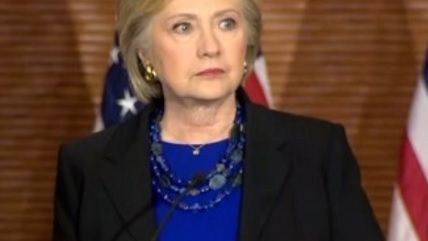Donald Trump's Secret Weapon Is Hillary Clinton
Race to the bottom.

Don't think of the 2016 presidential election as a popularity contest. Think of it as a race to see which candidate the American electorate detests slightly less.
These days, there's a lot of excitement in Trumpland. Since March, the billionaire has picked up 11 points in the Washington Post/ABC News national poll, nudging him slightly ahead of Hillary Clinton at 46 percent to 44 percent. We find a similar statistical tie in the most recent NBC News/Wall Street Journal poll, with Clinton leading by three points, 46 percent to 43 percent. Most polls show a predictable partisan split.
Trump is "surging," they say.
Now, I'm not sure why we keep treating national polls with such deference. For one thing, it's way too early. President Obama, for instance, led Sen. John McCain (R-Ariz.) by a couple of points in the same NBC/WSJ poll in April 2008. For another, as liberal columnist Juan Williams points out, it's far more informative to take a state-by-state look at polls, where we see just how difficult it will most likely be for the presumptive Republican nominee to win the electoral college.
Still, naturally, it's better to gain in the polls than not.
The relative closeness of the race might come as somewhat of a surprise to those who've seen the unprecedented antagonism of the GOP primaries, Trump's general obnoxiousness, and ongoing efforts by intrepid conservatives to mount a third-party candidacy. But it shouldn't.
Although I'm still skeptical Trump will remain competitive, it's not inconceivable that voters who loathe the political class with this much vigor will slap around conventional wisdom for a little bit longer. There are plenty of pundits warning Democrats not to underestimate Trump's crossover appeal to independents and other groups. But perhaps Democrats are just seriously overestimating Clinton's appeal.
Nearly 6 in 10 Americans "dislike" or even "hate" Clinton, according to a new NBC News/SurveyMonkey election-tracking poll. According to the NBC/WSJ poll, more than of half of registered voters claim their vote is mostly about opposing the other candidate. And in the Washington Post/ABC News survey, as well as a new CBS/New York Times poll, an "unfavorable impression" of both candidates is approaching the 60 percent mark. Trump's is a bit higher than Clinton's.
Thanks to Clinton, Trump's unification of the GOP is still happening despite his best efforts. Anecdotally speaking, the rationalization I hear most from conservatives who now begrudgingly back the billionaire has nothing to do with the candidate's policy positions, outlook or temperament. It's generally little more than a deep detestation of Clinton, who conservatives believe must be stopped for the good of the country. The thought of a Clinton presidency is unpalatable for most Republicans, in a way that even an Obama presidency wasn't. President Obama's favorability numbers in 2008 and 2012 were far better.
Clinton rouses a special kind of disdain. So does Trump, who carries around historically low favorability numbers among female, black, Hispanic, and Asian voters. But we shouldn't forget that a chunk of those numbers are already baked into the electoral cake for Republicans. The GOP candidate was going to lose those groups anyway, even if a soft-spoken establishmentarian had won the primary. Obama, for instance, won 73 percent of the Asian-American vote in 2012. What percent will Clinton win? 75? Right now, 62 percent have a favorable view of her. The numbers may be similar, but they are unlikely to be much worse.
Don't get me wrong: Trump will almost certainly exacerbate the GOP's minority problem in the long run and ensure that it's a generational issue. But let's put it this way: Although all the ugly things Democrats usually say about Republican candidates might actually be true this cycle, it doesn't look like they will shake up the traditional dynamics of a partisan presidential election in the short term. The only way it seems Trump will suffer is if his own party turns on him (fingers crossed).
This is mostly due to the fact that Clinton is a galvanizing force for conservatives, like few others. Is she the same for liberals? She does not possess the charisma of Obama, nor the idealism. Her campaign is predicated on a single unbreakable promise: She will do whatever it takes to become president. She is a woman, yes. She will promise to protect Obama's legacy—a collection of policies that half the country still doesn't like. No one trusts her to keep her word. She is ethically compromised. The unfolding Terry McAuliffe mess—and the entire decade of the 90s, to think of it—should remind us that the Clintons are always on the brink of a scandal.
These are not things that will make her more popular. (But all of these things, incidentally, also make good fodder for the #NeverTrump argument that conservatives should sit this one out. An ethically compromised, unpopular, unreliable liberal presidency would almost certainly reanimate conservatism.)
It's early. A lot of things can disrupt these dynamics. Perhaps it will be the libertarian or a third-party candidate, although, at this point, Libertarian Gary Johnson, who is polling at 10 percent in a number of polls, is drawing more from Clinton than he is from Trump. As it stands now, the luckiest thing that's happened to Trump might be Clinton.
COPYRIGHT 2016 CREATORS.COM


Show Comments (44)